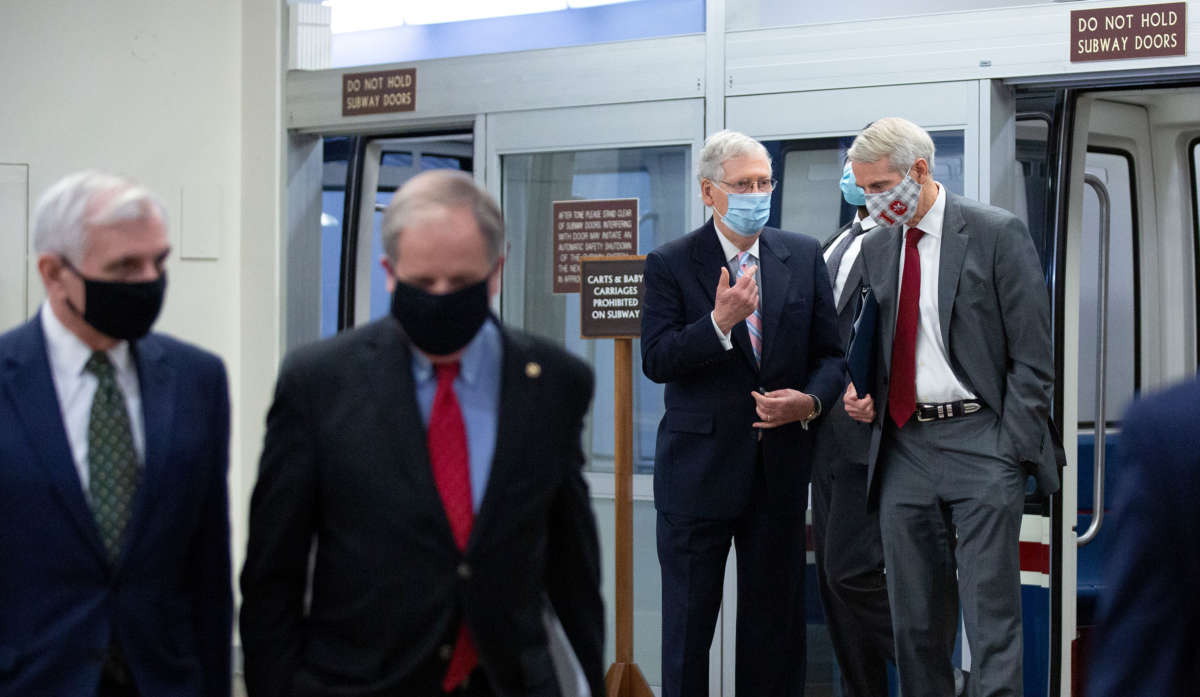Honest, paywall-free news is rare. Please support our boldly independent journalism with a donation of any size.
Republican Majority Leader Mitch McConnell adjourned the U.S. Senate for the rest of August on Thursday after failing to come anywhere close to approving another Covid-19 relief package, leaving tens of millions of out-of-work, hungry, and eviction-prone Americans without additional financial aid as the pandemic and economic crisis continue with no end in sight.
“During the worst economic crisis since the 1930s, Mitch McConnell and Senate Republicans think they can take a long vacation while millions of Americans face hunger and eviction. That is morally obscene,” Sen. Bernie Sanders (I-Vt.) said in response to McConnell’s decision. “It’s time for the do-nothing Republican Senate to finally do its damn job.”
The departure of the Republican-controlled Senate comes after an attempt to revive Covid-19 relief talks earlier this week quickly failed as Democratic leaders and Trump administration officials remained far apart on key issues, from emergency funding for the U.S. Postal Service to aid to faltering state and local governments. In her weekly press conference Thursday, House Speaker Nancy Pelosi (D-Calif.) said White House negotiators refused to budge from their insufficient relief offers.
The Senate is not expected to return until September 8, when economic conditions are likely to be even more dire for the 40 million people at risk of eviction, 30 million facing drastic income cuts due to the lapse in enhanced unemployment benefits, and 14 million households with children that don’t have enough to eat.
“This is pathetic and devastating,” consumer advocacy group Public Citizen tweeted after McConnell adjourned the upper chamber until after Labor Day. Just before skipping town, the Kentucky Republican advanced five more of President Donald Trump’s right-wing judicial nominees.
Senate adjourned until 9/8, but not before @senatemajldr moved forward on 5 more of Trump’s judicial nominees. It’s shameful that McConnell is focused on stacking the courts instead of saving USPS, funding elections, and extending census deadlines. Our democracy deserves better. https://t.co/cR6tr664i5
— Vanita Gupta (@vanitaguptaCR) August 13, 2020
Earlier Thursday, the Labor Department reported (pdf) that 963,000 Americans filed for unemployment benefits last week — a figure that corporate news outlets presented as the first time since March that initial weekly jobless claims dipped below a million.
But Julia Wolfe, state economic analyst at the Economic Policy Institute, wrote in a blog post Thursday that the Labor Department’s report downplays the number of workers who filed for unemployment benefits last week. The actual figure, according to Wolfe, is 1.3 million.
“Astonishingly high numbers of workers continue to claim UI, and we are still 12.9 million jobs short of February employment levels,” Wolfe wrote. “And yet, Senate Republicans allowed the across-the-board $600 increase in weekly UI benefits — the most effective economic policy crisis response so far — to expire.”
“In an unserious move of political theater, the Trump administration has proposed starting up an entirely new system of restoring wages to laid-off workers through executive order (EO),” Wolfe continued. “But even in their EO wishlist, the Trump administration would slash the federal contribution to enhanced unemployment benefits in half, to $300. This inaction and ongoing uncertainty is causing significant economic pain for workers who have lost their job during the pandemic and their families.”
With tens of millions of low-income and middle-class Americans facing financial ruin as the White House and congressional Republicans stonewall an additional relief package, the Washington Post’s Heather Long reported Thursday that the coronavirus-induced recession “is over for the rich.”
“U.S. stocks are hovering near a record high, a stunning comeback since March that underscores the new phase the economy has entered: The wealthy have mostly recovered. The bottom half remain far from it,” Long wrote. “This dichotomy is evident in many facets of the economy, especially in employment. Jobs are fully back for the highest wage earners, but fewer than half the jobs lost this spring have returned for those making less than $20 an hour.”
NEW: The recession is largely over for the rich. The working class remain in deep pain.
-Stocks r near record highs
-Home values at all-time highs
-Jobs r back for affluentMeanwhile…
-Jobs less than 1/2 recovered for low-wage workers
-$600 UI expired https://t.co/csGZqYefLN pic.twitter.com/c88yBcCeVo— Heather Long (@byHeatherLong) August 13, 2020
In a statement Thursday, Kyle Herrig, president of advocacy group Accountable.US, slammed the Republican-controlled Senate for opting to “pack up and leave Washington for a month without making a new deal to assist American workers and small business owners.”
“The luxuries of paid time off and premium health insurance afforded to senators is of little help to the millions of Americans who lost their jobs during this crisis,” said Herrig. “Where is the urgency to get workers and their families the help they need?”
Sen. Ron Wyden (D-Ore.), one of the architects of the now-expired $600-per-week unemployment insurance boost, tweeted: “Donald Trump is suppressing votes to steal an election. Almost 30 million are on unemployment and 160,000 Americans are dead. McConnell just adjourned the Senate for a month.”
“Every time I think Republicans can’t run this country any further into the ground,” Wyden wrote, “they prove me wrong.”
Holding Trump accountable for his illegal war on Iran
The devastating American and Israeli attacks have killed hundreds of Iranians, and the death toll continues to rise.
As independent media, what we do next matters a lot. It’s up to us to report the truth, demand accountability, and reckon with the consequences of U.S. militarism at this cataclysmic historical moment.
Trump may be an authoritarian, but he is not entirely invulnerable, nor are the elected officials who have given him pass after pass. We cannot let him believe for a second longer that he can get away with something this wildly illegal or recklessly dangerous without accountability.
We ask for your support as we carry out our media resistance to unchecked militarism. Please make a tax-deductible one-time or monthly donation to Truthout.
